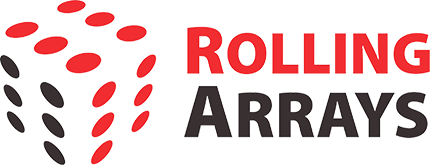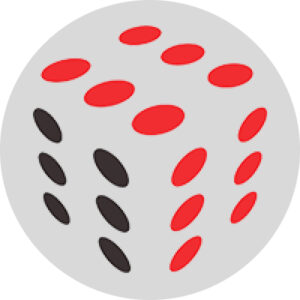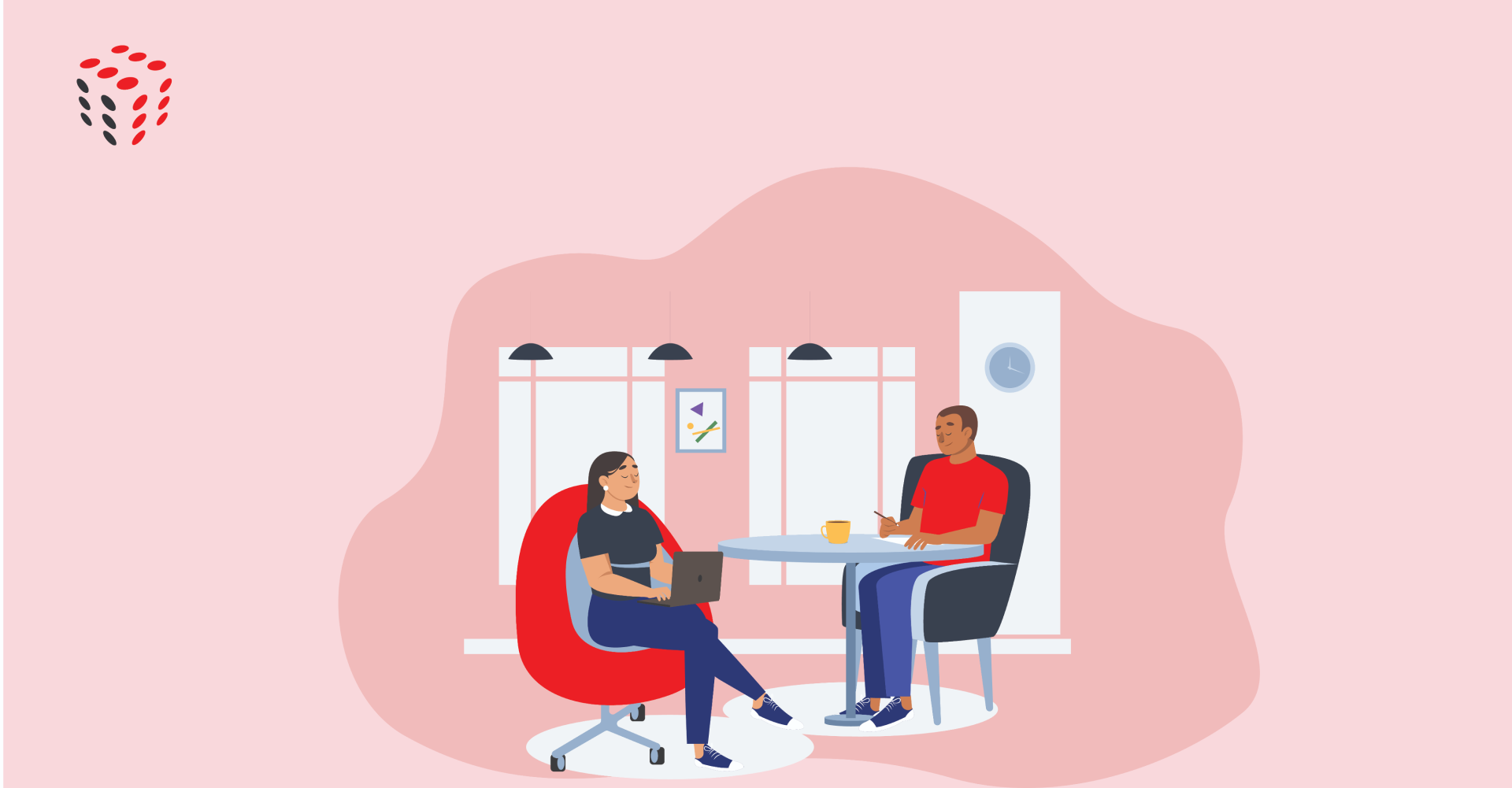
Resources > Blog >Top 5 Well-Being Apps to unlock the potential of your employees
Top 5 Well-Being Apps To Unlock The Potential Of Your Employees 2023
Published on Sep 06, 2023

Maintaining employee well-being is more critical than ever in the increasingly hectic and stress-ridden professional landscape of the 21st century.
As Human Resources professionals, especially those operating in the dynamic markets of Singapore and Malaysia, you play a pivotal role in nurturing your workforce’s wellness and overall job satisfaction.
A happy, healthy employee is a productive one, and by incorporating the right tools, you can effectively boost your team’s morale and productivity.
This shift towards a more holistic perspective of employee wellness has ushered in an era of digital well-being apps. These technological solutions can seamlessly integrate into your employees’ lives, helping them balance their professional responsibilities with personal well-being.
With these apps, they can manage stress, anxiety, improve physical health, and enhance mindfulness, contributing to their overall wellness.
This blog lists the top 5 well-being apps designed to support employee health and happiness.
As you navigate these recommendations, you’ll learn how each app can benefit your team and fit within your organisation’s wellness strategies.
Whether you want to enhance your existing employee wellness program or implement a new one, these app recommendations will equip you with a resourceful starting point.
Dive in and discover the transformative potential of well-being apps for your workforce’s health, happiness, and productivity.
The Growing Importance of Well-being in Modern Life
Well-being is defined as being comfortable, healthy, or happy. It encompasses physical, mental, and social aspects of one’s life. Well-being is essential for individuals and society, affecting personal fulfilment, productivity, and social cohesion.
However, well-being is increasingly challenged by the modern lifestyle, which is often characterised by stress, anxiety, and other mental health issues. According to various sources:
- In a new survey, 68 per cent of respondents in Singapore said they found 2021 to be the most stressful year ever.
- In another study among Malaysian university students, anxiety was much higher; 30.5% were experiencing mild, 31.1% moderate, and 26.1% severe anxiety.
- In a survey on mental health and wellness conducted by Rakuten Insight in Singapore in May 2022, 51% of the respondents indicated a higher stress or anxiety level in the past 12 months.
- In 2020, the number of people living with anxiety and depressive disorders rose significantly because of the COVID-19 pandemic globally.
These mental health issues can have severe consequences for individuals and society, such as reduced quality of life, impaired functioning, increased risk of physical illness, self-harm, suicide, and economic losses.
Therefore, finding ways to cope with these challenges and enhance well-being in modern life is vital. One of the ways that technology can help is by providing well-being and wellness apps.
These applications aim to improve well-being by offering various features and services, such as mindfulness, meditation, exercise, nutrition, sleep, mood tracking, coaching, therapy, and more.
Well-being and wellness apps can offer several benefits for users, such as:
- Convenience: Users can access well-being and wellness apps anytime and anywhere.
- Affordability: Many well-being and wellness apps are free or low-cost compared to traditional services or products.
- Personalisation: Users can customise their well-being and wellness apps according to their preferences, needs, and goals.
- Effectiveness: Some well-being and wellness apps are based on scientific evidence or proven methods that can improve one’s well-being.
- Support: Users can receive feedback, guidance, encouragement, and community support from well-being and wellness apps.
Key Features to Consider When Selecting a Well-being App
The selection of an effective well-being app should be based on its relevance to your workforce’s needs, ease of use, and capacity to engage users consistently. Here are some key factors to consider:
- Relevance and Diversity of Content: The app should offer diverse and extensive content relevant to different aspects of well-being, including physical health, mental health, mindfulness, diet, sleep, and more. This ensures the app caters to your workforce’s varied needs and preferences
- User Experience: The app should be intuitive and user-friendly, making it easy for your employees to navigate through different features. A clean design and smooth functionality can significantly impact user engagement.
- Personalisation: Each employee’s health needs and wellness journey is unique. Thus, a well-being app that offers personalisation, such as customisable programs or adaptive learning algorithms, will likely be more effective.
- Integration and Accessibility: The app should easily integrate with other health-tracking devices or platforms. Moreover, it should be accessible across multiple devices, ensuring employees can access it whenever needed.
- Data Security: Since wellness apps handle sensitive health information, they must adhere to strict data privacy and security standards to protect user data.
Considering these, the next section will present our top 5 well-being apps, their key features, and how they can enhance your employees’ wellness journey.
Top 5 Well-being App Recommendations
Intellect
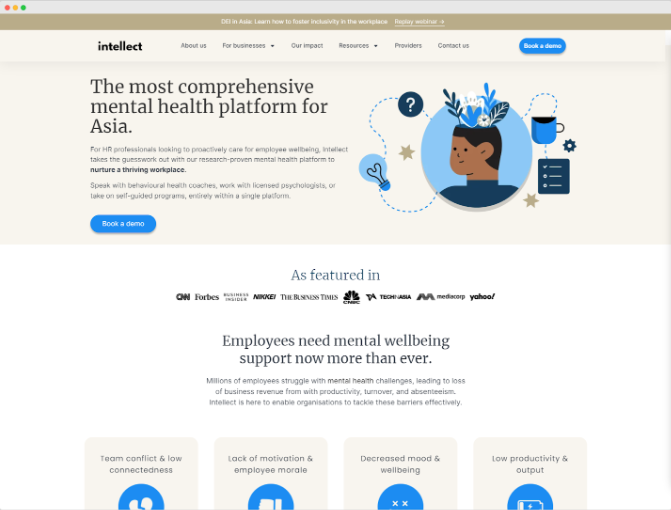
Intellect is a Singapore-based startup that aims to make mental health care more accessible and affordable in Asia. It offers a comprehensive mental health platform with various features and services, such as a self-care app, skill-building programs, behavioural health coaches, counsellors, psychologists, and full-stack clinical EAP services.
Intellect’s unique feature is that it is tailored to the Asian context and culture, where mental health is often stigmatised and misunderstood. Intellect educates users that mental well-being is for everyone, not just those in a critical state. It also provides localised content and support in 14 languages across 20 countries in Asia.
Intellect has over 3 million registered app users and works with over 100 organisations to provide mental health benefits to their employees. It has also raised $2.2 million in pre-Series A funding to expand its reach and impact across Asia. Intellect is one of the leading mental health apps in the region that aims to bridge the gaps and challenges in the mental health space.
MindFi
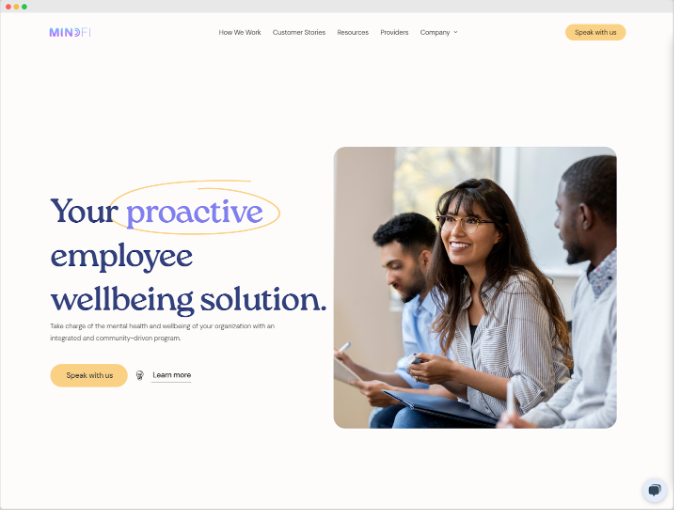
MindFi is a Singapore-based startup aiming to provide a personalised well-being toolkit that fits your pocket. It offers a comprehensive mental health platform with various features and services, such as a self-care app, skill-building programs, behavioural health coaches, counsellors, psychologists, and full-stack clinical EAP services.
MindFi’s unique feature is its data-driven approach to assessing your well-being and recommending resources, tools, and support that suit your needs. Based on the WHO-5 framework, it analyses your mental well-being, moods, and physical health data from wearables to personalise your well-being journey.
MindFi has over 100 corporate clients across the Asia Pacific and helps them to enhance employee well-being and engagement. It also provides access to a broader community of experts and peers who can offer tips, guidance, and support on various well-being topics. MindFi is one of the leading mental health apps in the region that aims to help you discover your best self.
What is the WHO-5 framework?
The WHO-5 framework is a questionnaire measuring current mental well-being. It consists of five positively worded items, such as I have felt cheerful and in good spirits. Each item is rated on a 6-point Likert scale from 0 to 5. The total score ranges from 0 to 25, with higher scores indicating better well-being.
The WHO-5 framework is widely used as a screening tool for depression and anxiety and a measure of well-being in various settings and populations. It has been validated in different languages and cultures and has shown good reliability and validity. The World Health Organization also recommends it as a simple and effective way to monitor well-being and mental health.
ThoughtFull
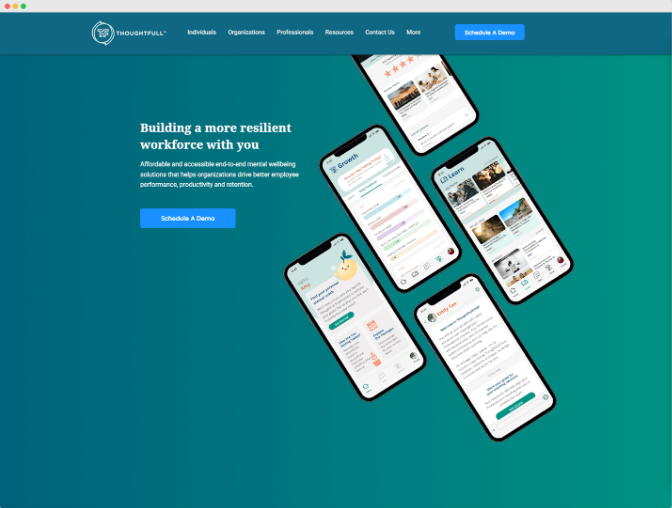
Thoughtfull is a Singapore-based startup that aims to provide end-to-end mental well-being solutions for organisations and individuals. It offers a comprehensive mental health platform with various features and services, such as a self-care app, skill-building programs, behavioural health coaches, counsellors, psychologists, and full-stack clinical EAP services.
Thoughtfull’s unique feature is that it provides daily bite-sized coaching that is personalised, proactive, and preventive. Users can chat with certified mental health professionals anytime, anywhere, and receive feedback, guidance, and support on their well-being journey. Users can also access curated learning modules, assessment tools, and tracking tools to enhance their mental resilience.
Thoughtfull has partnered with over 100 organisations across the Asia Pacific to deliver mental well-being benefits to their employees. It also provides affordable and accessible mental health care to individuals who want to engage with their well-being proactively. Thoughtfull is one of the leading mental health apps in the region that aims to create a more resilient and productive workforce.
Wysa
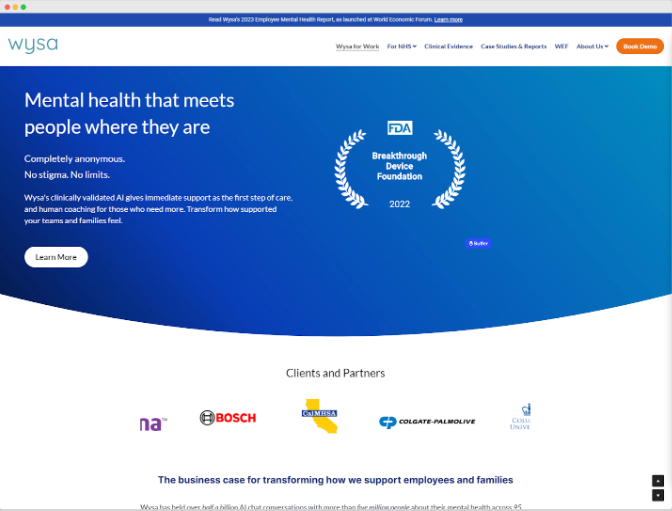
Wysa is a UK-based startup that aims to provide affordable and accessible mental health care for everyone. It offers a comprehensive mental health platform with various features and services, such as a self-care app, skill-building programs, behavioural health coaches, counsellors, psychologists, and full-stack clinical EAP services.
Wysa’s unique feature is that it uses an AI-enabled chatbot (Wysa the Penguin) that delivers messages in a text-like environment employing fundamental teachings drawn from cognitive behavioural therapy (CBT), dialectical behaviour therapy (DBT), mindfulness meditation, yoga, and other relaxation tools. Users can chat with Wysa anytime, anywhere, and receive empathetic, helpful, and non-judgmental support on their well-being journey. Users can also access curated CBT programs and on-demand self-care exercises to enhance their mental resilience.
Wysa has over 5 million users across 95 countries and works with over 100 organisations to provide mental health benefits to their employees. It has also raised $13 million in Series A funding to expand its reach and impact globally. Wysa is one of the leading mental health apps in the world that aims to make mental health care more accessible and affordable for everyone.
Unmind
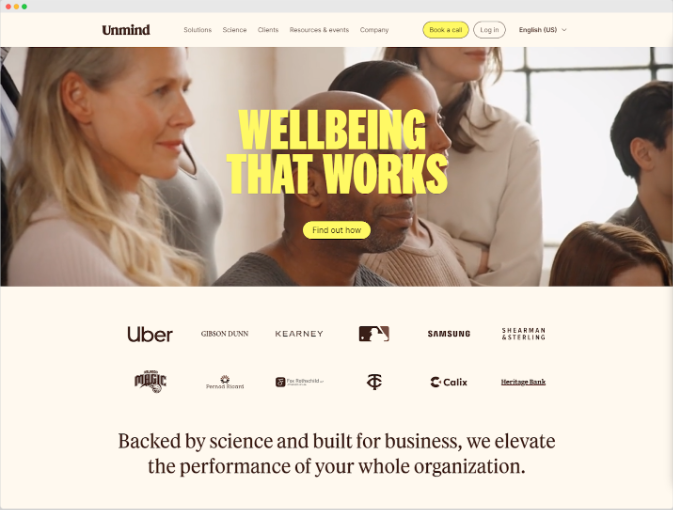
Unmind is a UK-based startup that aims to provide end-to-end mental well-being solutions for organisations and individuals. It offers a comprehensive mental health platform with various features and services, such as a self-care app, skill-building programs, behavioural health coaches, counsellors, psychologists, and full-stack clinical EAP services.
Unmind’s unique feature is its data-driven approach to providing insights and actions for organisational well-being. Based on the WHO-5 framework, it analyses the well-being of employees and teams across different domains, such as happiness, calmness, health, connection, and fulfilment. It also provides personalised recommendations and resources for users to improve their well-being.
Unmind has partnered with over 100 organisations worldwide to deliver mental well-being benefits to their employees. It also provides access to a broader community of experts and peers who can offer tips, guidance, and support on various well-being topics. Unmind is one of the leading mental health apps in the world that aims to create a more resilient and productive workforce.
Conclusion
As the workplace evolves and the understanding of the importance of mental health deepens, integrating digital wellness tools into the fabric of our organisations is more than a trend – it’s a necessity. For HR professionals, the challenge is in selecting the right tools that will genuinely address the unique needs of their workforce.
Our evaluation of the top five well-being apps is a starting point in your journey to cultivating a healthier, more productive, and more engaged workforce. Remember that the most effective well-being program takes a holistic approach to employee wellness, considering physical, emotional, and mental health. With the right digital tools in place, you can foster an environment that empowers your employees to take charge of their health and, in turn, bring their best selves to work each day.
The future of work is inevitably intertwined with the future of well-being. As HR leaders, you are uniquely positioned to steer your organisation towards a healthier, more supportive, and ultimately more prosperous future. While our top five well-being apps offer excellent solutions, continue to explore the market, remain open to advancements, and remember that the well-being of your workforce is a journey that deserves consistent attention and investment.
